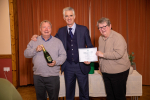In my column last month I wrote about the Jobs’ Fair that I was due to hold in Great Cornard on April 22nd – bringing local employers, job-hunters and skills providers together in one place. I’m pleased to confirm a fantastic turnout from all sides. Most importantly, since the fair was held, we’ve had confirmation of new jobs for those who attended the event – that’s my constituents who arrived unemployed and left the event ready to start work the following Monday. Good news, in challenging times.
I do appreciate just how challenging these times are becoming for so many, facing higher prices on a broad front; not least, household energy bills. I also wrote about the cost of living last month, and in the weeks since it’s become even clearer just how profound inflationary pressures are. In front of the House of Commons Treasury Select Committee, the Governor of the Bank of England, Andrew Bailey, stated that about 80% of this pressure on prices was ‘external’. That means that by far the greatest part of this new inflation is global in nature.
I highlight this point not to suggest that the Government should not try to help. Yet, with global forces at work we must be clear about our limited ability to bring relief, and we should certainly avoid trying to find scapegoats. Given the primary remit of tackling higher prices rests with our independent Bank of England, inevitably some have started to question its judgement. But I find it hard to believe that someone else in charge of the key tools that address prices in ‘normal times’ – i.e., interest rates – would have found the situation any easier. There simply is no easy answer.
I would compare the situation with the Bank of England to that of the judiciary. As the Justice Minister with responsibility for the Courts, I constantly have to stress that as a Government we make the laws, but it’s our independent judiciary – juries; judges; magistrates – who make the decisions. They are independent, and that independence is sacrosanct.
Just as Ministers should not intervene in judicial decision making, I don’t believe that we would make things better by questioning the independence of the Bank of England. Without political pulls, the Bank can make objective decisions in the national interest. But this doesn’t make such decisions any easier when the circumstances are so incredibly difficult, as they are now.
Indeed, we are likely to be in a situation where the priority is to avoid making things worse rather than striving to find some ‘magic bullet’ answer, when we all know such an option does not exist. The Government has to retain overall credibility of economic policy, even if part of that is recognising that there is a limit to what the Government can do. Ministers are obviously very much aware of the pressure that people are under, but the worst thing right now would be to panic; throw caution to the wind with no regard to the long-term public finances, and commit unaffordable sums to try and ‘solve’ the situation.
After all, cutting taxes and raising spending is - all other things being equal - likely to add to inflation, not reduce price pressures. Hence, my view is to stress that we should look at what further targeted measures we could provide - particularly for the most vulnerable and those on the lowest incomes - whilst maintaining control of the public finances and keeping a firm hand on the tiller.
It is far from all being doom and gloom. We may face a cost of living crunch, but others in our continent face war, and so it was fantastic to see Sweden and Finland committing to join NATO. As nations look to do more and more to cut reliance on Russian energy, the achievement of driving two ‘neutral’ nations into NATO underlines once again the strategic blunders that Mr Putin has made.
Whilst looking at the positives, it was thrilling to watch Eurovision with such a fantastic UK entry, and I was chuffed to bits both that Ukraine awarded us 12 points, and that they then went on to win. Perhaps it’s because I was born in April 1974 when Abba’s ‘Waterloo’ was number one, a great Eurovision hit, but I do think the international unity that we saw at Eurovision matters, sending a powerful signal of hope.
Peace and prosperity will return, at home and abroad, provided that we hold our nerve on both the economic and strategic fronts.
Published in the Suffolk Free Press.

